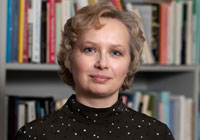
Photo credits:
Johan Wahlgren
SCAS News - 7 December, 2020
Reflections by a Fellow - Merja Polvinen
The IAS Network and Interdisciplinary Careers
My autumn term 2019 at SCAS seemed a whirlwind of new environments, new minds and new
thoughts.
There was so much to take in, and yet so much I wanted to do with the time I had been
given for my
own
work. By the time the New Year had passed, I gave a sigh of relief at the chance
to settle down at Linne-
anum for the long spring term of quiet, uninterrupted work. Little did I know,
etc. …
The COVID-19 pandemic interrupted the whole world, and it also interrupted our small community.
But
the efforts by Christina Garsten and her team in maintaining that community were extraordinary,
and while
so many of us were scattered around the world, the roots to SCAS remained and the work
continued.
Zoom may not be the same as the Thunberg Hall, and my little work-space at home in Helsinki is certainly
not the Linneanum library, but the contacts remained, and everything I learned from
my colleagues at SCAS
and at the Uppsala University will continue to feed into my work for years to
come.
Even as I sat down at SCAS to write the monograph I came there to write, another project was coming
to an end: a venture between Nordic Scholars on The Place of the Cognitive in Literary Studies, funded
by the Joint Committee for Nordic Research Councils in the Humanities and Social Sciences (NOS-HS)
for 2018–2019. That project, led by Karin Kukkonen and with Anežka Kuzmičová, Steen Ledet Christian-
sen and myself as the organising committee, had as its primary aim a theoretical and practical query about
what kind of a cooperation can and should be formed between the cognitive sciences and literary studies,
and this work we explored in a joint publication (open access journal issue here).
Another of the project’s goals was to think about two kinds of impact that the interdisciplinary field of
cognitive literary studies can have in the societal and institutional structures that surround us. Firstly,
we
wanted to see how we could use our conceptual toolkit to speak to the larger public about the impact
of
reading in society, and for that purpose we spent time examining different kinds of outreach projects
involving e.g. reading groups, bibliotherapy and teacher education. But secondly – and more relevantly
for this blog post – we wanted to use our collective experience of interdisciplinary research careers to
say something about how universities and other institutes of higher education could offer support for
such
careers, beyond the celebratory rhetoric often heard in strategy papers and annual opening speech-
es.
For this second aim, we created a policy brief, shared with academic institutions and funding bodies, that
outlines some of the most pressing practical problems that young scholars still face when setting out on an
interdisciplinary career (you can find the full brief here). Many of these problems are very familiar to anyone
who has tried to continue their scholarly career beyond an interdisciplinary PhD and postdoc: the inherent
slowness of developing new skills and contacts in different fields of research; the lack of recognition of the
publication fora for interdisciplinary work; and finding, at the end of the postdoc phase, that academic posi-
tions
are still designed to fit within specific disciplines, a situation that leaves the interdisciplinary scholar
“profiled
out” in competition for permanent positions.
For these reasons, institutions of advanced study such as SCAS, and programmes such as the Pro Futura
Scientia Programme, are so vital for furthering the careers of those early-career scholars who work in
be-
tween disciplines. The personal risks associated with such work are still present for the current generation,
since despite the goodwill shown towards interdisciplinary work within academia, the base-level institutional
structures within which we live have not yet adapted to make that goodwill a reality everywhere. Work to-
wards
making those structures more flexible is underway, but until we see the fruits of that work, we need
SCAS and
its companion institutes in the IAS network to offer a home for scholarship that does not fit in any
specific box,
for research that needs that little bit of extra time to work through, and for projects that are, in
one way or another,
offbeat, unsual, singular or strange. Recognising the value of such work must also tran-
slate
into concrete support,
and that is what we find in Institutes for Advanced Study.
I want to thank everyone at SCAS for making my year there so extraordinary, and my colleagues in the NOS-
HS
project for being such excellent companions in interdisciplinary endeavour.
Merja Polvinen is University Lecturer in English Philology and Docent in Comparative Literature at the Uni-
versity
of Helsinki. She was Erik Allardt Fellow in residence at the Swedish Collegium for the academic year
2019–20.
Read more about Merja Polvinen >>
Previous contributions to the
Reflections by a Fellow series:
Terje Falck-Ytter: A Bridge Between Faculties
Susanne A. Wengle:
My Year at SCAS - the Liberal Arts Education That I Never Had
Steve Chenoweth: Steve Chenoweth Reflects on His Time as a Fellow of the SCAS Natural Sciences Programme
Anders Hillborg:
What Is It Like to be a Composer-in-residence at an Institute for Advanced Study?






